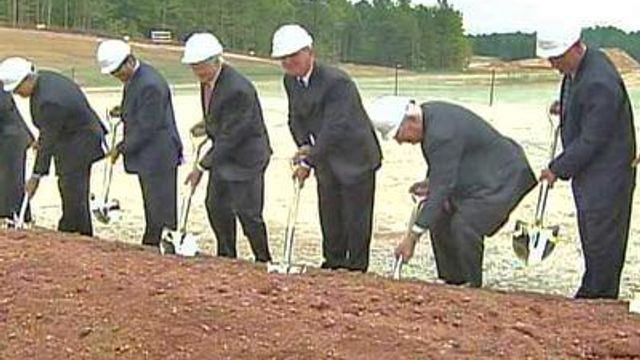Economist: Water Shortage, Tighter Restrictions May Dampen Business
As Raleigh tightens water restrictions from Tuesday, a recent report says demand for water won't abate in the next 30 years - a fact that has a local economist worried about the trickle-down effect on businesses.
Posted — UpdatedAmid new, stricter water restrictions, the demand for water in Raleigh is expected to double in the next 30 years, according to a recent report. Dr. Mike Walden fears that report will discourage new businesses from coming to the Triangle.
"If businesses feel that maybe North Carolina is now in a new weather pattern, where water is going to be limited, that may affect our ability to attract new businesses," said Walden, a professor at North Carolina State University.
Walden estimates the drought could cost the state up to half-a-billion dollars annually.
Infrastructure is key to drawing new investment by industries, ranging from pharmaceutical companies to Pepsi Cola, said Kenneth Atkins, Wake County's economic director.
Novartis asked the City of Raleigh a few questions about infrastructure before it broke ground on a new plant in Holly Springs last week, Atkins said.
"Water and sewer, (those) capacities are one of the things they look at," he said.
Atkins said he's confident that future plans to increase and conserve Raleigh's water supply will help keep new businesses coming.
"I'm not concerned with companies having a problem with our water here," Atkins said, "simply because it is reasonably priced, it is available, and I think there are efforts being made in a lot of areas for conservation."
A $90 million improvement project at the Benton Water Treatment plant is scheduled to be complete in the spring of 2010. The city also plans to expand the water plant at Falls Lake and build a brand-new reservoir.
As the city considers projects to keep the water flowing and businesses afloat, residents will feel the impact of stricter water-use restrictions from Tuesday.
City officials warned against allowing irrigation systems to water impervious surfaces, including streets, parking lots, driveways and sidewalks.
Homeowners are also restricted to washing cars and power-washing homes and sidewalks only on the weekends. Businesses that provide such services are exempted from this restrictions.
The new restrictions also come with higher fines: A first violation will cost offenders $200, and officials said no warnings will be given out. A second violation brings a $1,000 fine, and after a third violation, water customers could have their service cut off.
The water restrictions will reach further into Wake County than Raleigh. The restrictions will apply to all customers on the City of Raleigh's water system, including residents of Garner, Rolesville, Wake Forest, Knightdale, Wendell and Zebulon.
The new restrictions come as Raleigh's water use continues to break 2006 levels, according to Robert Massengill, Raleigh's assistant public-utilities director.
Between Aug. 24 and 26, Raleigh water users consumed an average of 65.6 million gallons of water daily, compared to a daily average of 60.5 million gallons during the same dates last year.
Raleigh also set the top three records for daily water use in August, topping the charts with 77 million gallons on Aug. 9.
• Credits
Copyright 2024 by Capitol Broadcasting Company. All rights reserved. This material may not be published, broadcast, rewritten or redistributed.





